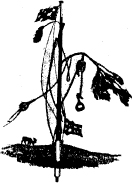6. A pounce of pirates
JACK PROCEEDED to take charge. He concluded that our major problem was lack of organization and the first thing he did was hold a conference in Enos’s kitchen. This was attended by Obie, Enos, myself, and an unidentified passerby who said nothing but who spat little geysers of tobacco juice that sizzled on the hot stove top.
In his best board-room manner Jack explained that we had been wasting too much time. The almost daily trips to St. John’s were not necessary, he said. Instead, we would make up a detailed list of every item of gear and equipment needed to complete the boat, then he and I would go to the city and in one day of intensive shopping would obtain everything we required.
Upon our return, the four of us, working to a carefully scheduled list of priorities, would pitch in and complete the vessel in a hurry.
“Well, gentlemen, do you agree?” He looked brightly at us for approval.
I looked at Enos, who looked at Obie, who looked at his rubber boots. Nobody said anything. It would have been unkind to have attempted to dampen such innocent enthusiasm.
Jack and I drove to St. John’s the next day with the battered Buick in tow behind Passion Flower. When we reached the city we parted, each with his own list, agreeing to meet again at six o’clock at a waterfront bar. Jack took the jeep but I, who had had quite enough experience with the incredible traffic tangles in St. John’s, preferred to walk.
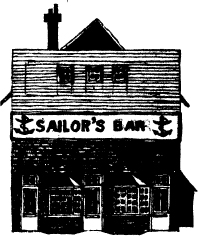
I arrived at the bar a little before six. Jack appeared a few minutes later and I hardly recognized him. His blond, usually impeccable hair was a tangled mop. His eyes glared bloodily. There was a spasmodic twitch to his left cheek muscles and his breath was coming and going in sharp, hard whistles.
It required three double rums before he was able to describe his day and then he only told me the highlights. He told of entering shop after shop, most of them empty of customers but full of salesclerks, and of seeing every clerk immediately vanish as if he were the carrier of bubonic plague.
“That’s because,” I explained sympathetically, “in St. John’s it’s considered socially demeaning for a clerk to wait on a customer. It isn’t done if it can possibly be avoided.”
Jack nodded grimly. “That was the least of it. I finally cornered a clerk in a hardware store just as he was making a break for the cellar. I backed him up against a rack of pitchforks and asked him, politely mind you, for five pounds of two-inch nails. And, my God, Farley, you know what he said?” Jack’s voice rose to an almost falsetto register. “He said if I would care to leave my order they would try to fill it and I could pick it up next week!”
“You were lucky.” I replied soothingly. “Usually they just tell you they don’t have what you want, or they may have it next year, or the year after that, or the….”
“But that’s not all,” Jack interrupted, the twitch in his cheek growing more pronounced. “After searching for two bloody hours I finally found a liquor store and there was actually someone at the counter and I asked him for a case of rum. You know what he did? He made me fill in an application for a special permit and then he sent me to the head office of the Board of Liquor Control to get the permit. It took me an hour to find the place and when I got there everyone was gone for lunch, even though it was half past three. I waited until half past four and finally some scruffy little character came along and told me the goddamn place only processed permits on Wednesdays!”
“That’s it, Jack. You see, in St. John’s all the store and office people need a lot of rest. It’s because they work so hard. But there’s another problem too. The merchants have so much money they don’t want any more. Haven’t got any use for it. It’s an encumbrance to them. You can see how they must feel when a fellow like you comes along and shoves a pile of money at them. Unless they can think fast they might have to take it. Anyway, what did you manage to get?”
Jack ground his teeth, thrust his hand into his jacket pocket, fished out a piece of paper and flung it on the table.
It was a parking ticket.
As for me, I had enjoyed a reasonably successful day. Out of the eighty-odd items on my list I had been able to purchase six. They were in a bag at my feet. Six bottles of rum. I had found a bootlegger who was not yet rich, and who didn’t mind demeaning himself by dealing with the public. There were not many businessmen like him in St. John’s.
Because most of what we needed for the boat was not to be had in St. John’s or could not be pried loose from the merchants, we learned to do what outport Newfoundlanders have done for centuries-we improvised. Enos was a master at this. When we needed chain plates for our rigging he got some scrap iron out of an ancient steamship wreck and cold hammered the rusty metal on a rock until he produced four very serviceable sets of plates. Smaller items of hardware he improvised from whatever might be found in the innumerable greasy boxes that cluttered every fisherman’s store, and in which, over the generations, every piece of scrap that had ever come to hand had been carefully put by against the hour of future need.
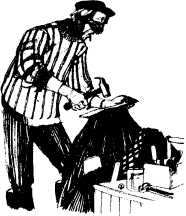
Occasionally we had to go further afield. The cavernous coffin Enos had built over the deck of the schooner was intended as a cabin trunk, but it lacked any means of letting in the light, so that the cabin itself was as dark as the inside of a molasses barrel. After a long search I did find a ship-chandler in St. John’s who grudgingly admitted he could supply portlights-at seventy-five dollars each—if I was prepared to wait six months until they could be ordered from England. Since I was not so prepared Obie came to the rescue.
Obie had relatives far down the Southern Shore on the Cape Pine Peninsula. Cape Pine is a bleak, forbidding thumb of rock jutting out into the steamer lanes. It is rimmed with reefs and walled against the sea by sheer granite cliffs. It boasts two settlements, two tiny clusters of humanity that somehow cling to the rock walls. How the people make a living seems, at first glance, to be a mystery, for they have no harbours, and it is seldom they can launch their open boats off the tiny beaches because of the tremendous seas that rack those coasts. But the people of St. Shotts and St. Shores (originally St. Jacques and St. Georges) do very nicely. They have gainful employment although they don’t talk about it much to strangers. In fact strangers to their coves are not only unwelcome, but may be in some personal jeopardy.
The fact is that the people of St. Shotts and St. Shores have been professional wreckers for generations past. During less constrained times they practised the wrecker’s art as a full-time occupation. A vast number of ships fell on their coasts, owing to a lamentable failure on the part of their captains to realize that the light they were steering by was not Cape Race (twenty miles to the eastward) but an excellent imitation thereof.
“In death there is life,” as a priest upon that shore used to intone as he stood on the cliffs, directing his parishioners in the salvage of cargo from some ship which had foundered with the loss of all hands on the wicked inshore reefs.
Nowadays, of course, the glorious free enterprise practice of using false lights has been curtailed. Nevertheless there are still vessels that make their own fatal errors and end up against the Cape Pine cliffs. Such vessels and their cargo belong, by law, to the underwriters who have insured them, but the people of St. Shotts and St. Shores do not subscribe to this particular law, nor I suspect, to any others either.
Obie and I drove down there in Passion Flower and we would never have reached the place in a lesser vessel for there was no road at all most of the way. Our arrival created a sensation. Not only did people peer at us from behind the curtains of every house, but so did the round black eyes of a number of swile guns—long-barrelled, smooth-bore guns intended for killing seals but adaptable to any number of uses.
Obie got out first, was identified, and immediately we were surrounded by masses of hulking great fellows who spoke a language that baffled me completely, even though by then I had developed some skill in dealing with Newfoundland dialects.
However language is not always important. When we off-loaded several bottles of rum we found we were speaking a universal tongue. We stayed the night at St. Shotts, with a brief excursion to St. Shores, and it was all a dream; a magical transportation back through time to a rougher and wilder age. At one point an old woman showed me a small mahogany case crammed with gold coins, some of them of early Spanish vintage. I was told that almost everybody in the two settlements had a similar cache hidden somewhere on the rocky barrens—insurance against the day when modern navigation aids finally deprive these people of their traditional means of making an honest living.
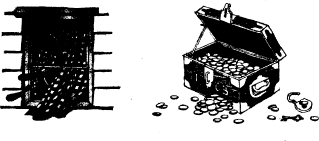
When we headed home the next morning Passion Flower was deeply laden. We had eight portlights, one of which was twenty inches in diameter and, with its bronze setting, must have weighed close to a hundred pounds. We also had enough bronze and brass deck and cabin fittings to meet all our needs.
There are those who speak of the St. Shotts people as pirates. Maybe they are. However if it comes to a choice between the pirates of St. Shotts and the pirates of St. John’s I know my choice.
Most of the residents of the Southern Shore were equally helpful. They and their ancestors had lived for centuries at the mercy of the merchants so they knew exactly what we were up against and they felt for us in our almost continuous need.
Foremost amongst them was Monty Windsor, a soft-spoken, thoughtful man who lived in a rambling house on a tiny, almost insular, peninsula in Aquaforte Harbour. The house had been both imposing and handsome when the Windsors built it nearly two hundred years earlier but it was now grown grey and sad. Monty Windsor was almost the last of that name in Aquaforte. He showed me the family Bible in which were recorded the births and the deaths of generations of Windsors dating back to 1774. Few of the men had died in bed. Most of them perished at sea, some as fishermen, some as sailors, some as whalers, some as privateers. It was a strange old book whose margins had been used for a variety of non-religious, but equally significant purposes.

Inked in a flowery and faded script at the end of Deuteronomy was a recipe for the cure of “throttles” (diphtheria). It called for the patient to smoke a clay pipe loaded with oakum (teased-out strands of tarred hemp rope) which had first been soaked in brimstone. After smoking this mixture he or she was to swallow a pint of black rum drawn straight from the keg.
Modern medical scientists may scoff, but it seemed self-evident to me that any bacillus or virus that could survive such a treatment would indeed have to be a super-bug. Again, any human being who could withstand the treatment probably had little to fear from germs in any case.
For generations the Windsors had run a whaling factory, a salt-fish plant, and a number of big fishing schooners, but now that was finished and all that remained was a warren of collapsing buildings on the harbour side. These structures held many memories of other ages but they also held treasures for such as us. Here we unearthed a great, two-bladed brass propeller that must have been made half a century earlier but which fitted the shaft of our engine perfectly. We found scores of blocks intended for three-masted schooners and enough smaller blocks to complete our own running rigging. Shackles, belaying pins, mast hoops, sister hooks—in fact, most of what we still needed—were to be found somewhere in the dusty corners of the Windsor buildings.
There remained one requirement that had us stymied. We needed two new spars and they were not to be found. Old masts abounded on the beaches and in the rotting hulls of abandoned schooners, but they were either too big or too old. After four centuries of ship building, wood gathering and forest fires, there was hardly any standing timber left on the Southern Shore. Nothing remained but twisted black spruce scrub—with one exception.
Across the narrow harbour from Monty’s house was a stand of almost virgin spruce. It was, in a way, a sacred grove. It had belonged to the family since the arrival of the first Windsor and had been jealously preserved by each succeeding generation as a source of spars, gaffs, and booms for the schooners of the Windsor fleet. Although that fleet had vanished many years earlier, the grove remained sacrosanct. While those trees still stood, undefiled and proud, something of the Windsor heritage remained intact. This, in any case, was how Monty felt about the grove. However when he heard we were having trouble finding spars, he sent a message down to Muddy Hole inviting us to visit him.
We came, Jack and I, and Obie and Enos, and when we reached Monty’s house he led us down to a scarred old dory lying on the shore. It was the last vessel of any kind the Windsors owned. There were two axes and some rope lying on the dory’s bottom.
“You fellows paddle across to the grove, yonder,” Monty told us in his quiet voice. “Climb up the slope a-ways to where you sees a big white rock, and just astern of it you’ll find a stand of spruce as straight and true as any on this island. Take what you needs. And make good and sure you gets the best there is.”
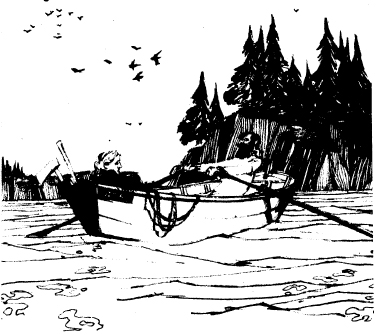
We did as we were told. Standing on the steep slope, in the odorous shadows of the trees, Enos marked the victims and we cut them down, limbed them, hauled them to the water’s edge, and towed them back to the harbour side. I went up to pay Monty for them but he would have none of my money.
“Don’t ye be talkin’, Skipper. There’ll never be need of another one of us cuttin’ a stick out of that grove. Likely there’ll never be another Windsor go to sea. I’ll take it fine to know your little bummer’s well spar’d with Windsor wood. It’s what those trees was growed to be.”
Spit-and-polish yachtsmen may shudder at the thought of anyone cutting down a tree one day and stepping it as a mast two days later with the sap still flowing out of it. Let them shudder. Those spars are still in the vessel as I write and they will last her lifetime, for Newfoundland black spruce, grown on the edge of the ocean, is one of the toughest woods in all the world. However it does have one peculiarity. The grain does not run straight up and down as in trees that grow in more favoured locations. In order to withstand the might of the everlasting gales, shore-grown black spruce grows twisted like a corkscrew or a barber’s pole. This gives it great strength but, as the dead tree dries, it tends to unwind. What this meant to us was that both our masts gradually untwisted, turning the crosstrees or spreaders in a circular movement. The cure was simple enough. Every month or two we simply eased off the stays, lifted up the masts, and re-stepped them after giving each a quarter turn. No problem.
The stepping of the masts was a great day at Muddy Hole. To celebrate the occasion Jack made a rapid trip to St. John’s and. finding the pettifoggers off their guard, he actually managed to buy a case of rum.
Most Southern Shore Newfoundlanders acquire a taste for rum soon after abandoning their mothers’ breasts, and by the time they are grown men they have developed a high degree of immunity to it, but it is not total immunity. Up until this day I had been master of the rum situation and had governed the issuing of rations according to the three cardinal tenets of rum drinking in Newfoundland. The first of these is that as soon as a bottle is placed on a table it must be opened. This is done to “let the air get at it and carry off the black vapours.” The second tenet is that a bottle, once opened, must never be restoppered, because of the belief that it will then go bad. No bottle of rum has ever gone bad in Newfoundland, but none has ever been restoppered, so there is no way of knowing whether this belief is reasonable. The final tenet is that an open bottle must be drunk as rapidly as possible “before all t’good goes out of it.” Having learned these rules I made it a point never to produce more than one bottle at a time.
Unfortunately Jack did not know the rules and I did not have enough foresight to brief him. When he arrived back from St. John’s I was away at the other end of the harbour. He carried the case on board the vessel and lovingly unpacked it, placing all twelve bottles on the saloon table, lined up like twelve little soldiers.
Enos and Obie came below to watch him, and Jack told me later that the ruby glow given off from the bottles, as they sat in a ray of sunshine coming through the forward portlight, was reflected in the oddest manner from the eyes of his two companions.
Jack then went back to the jeep for another load of supplies. When he returned to the boat every bottle was open and the corks had vanished. He went on deck to ask Obie about this phenomenon and Obie, wordless as usual, simply pointed to the water of the cove where twelve corks were floating seaward on the receding tide like a child’s flotilla.
It was at this moment I returned and at once I realized we had a crisis. Jack was for recorking the bottles with plugs of toilet paper, in lieu of anything better, until I explained that such a departure from tradition would certainly result in a mutiny and might well get us run out of Muddy Hole. The die was cast. There was no turning back; there was only one thing to be done.
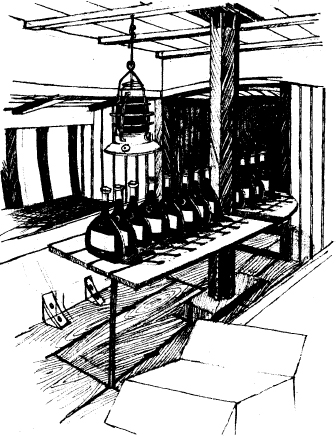
“Look,” I said in a whisper I hoped would not carry to the deck, “by afternoon every one of those bottles is going to be empty. That is a fact and you can rely on it. And if Enos and Obie do all the emptying there’s going to be damn little work done on the boat in the foreseeable future. We just have to sacrifice ourselves, Jack. Start drinking!”
Neither of us are born Newfoundlanders but we did the best we could.
The unclear events of that unclear day can only be hazily reconstructed but one of them stands out. That was when we went ashore to get the new mainmast which Enos had been shaping upon a pair of saw-horses in his front yard. The mast had to be carried about a quarter of a mile down the slope then out on the rickety stage and finally swung into the air and stepped aboard the boat. In preparation for this Obie and Enos went below and when they came on deck there were only eleven little soldiers left on the table. Then the two of them swaggered up to where the mast lay and picked it up, one at each end.
The weight proved a little too much for Enos—it weighed a good three hundred pounds—so Obie shifted to the middle of it, taking the entire strain on his own shoulder, and began to trot down the slope. Obie is a big man and very powerfully built but that mast diminished him until he looked like a small child carrying the biggest caber any Scotsman ever hefted.
Jack and I stood stunned and watched him go. He gained momentum with every plunging step. Enos ran along beside him, a sprightly terrier barking encouragement.
They reached the narrow stretch of level ground at the land-wash and Obie’s speed did not diminish. Enos stopped encouraging him and began to yell in a rising inflection:
“Fer Jasus’s sake, me son, slow down!”
It was no good. Gravity and momentum and various other physical laws which I don’t understand had taken full control. Obie went thundering out along the stage—which shook and quivered like a spider’s web—and he went right on off the end.
He and the mast made a fantastic splash and the sound brought the girls and the men at the fish plant running to the wharf to see what had happened. They saw Obie astride the mast, laughing like a gawk—a Newfoundland seabird—and paddling toward shore with his big, splayed hands.
That incident established the mood of the day. A dozen men from the plant abandoned their work and came to lend a hand. They fished the mast and Obie out of the soup and then the whole lot of them plunged into the cabin. When they emerged again there had been a slaughter amongst the soldiers but the crowd was now good for anything. They hefted the mast into the air, swung it around by main strength, and dropped it onto its step with such enthusiasm that I expected it to go right through the hull of the boat, skewering her forever to the bottom of Muddy Hole harbour. Then they all went back below for a moment, came out on deck again, picked up the foremast and flung it into place. Then they all went below again.
Still trying doggedly to implement our plan Jack and I attempted to get below too but there was no room. When we eventually reached the table there was one bottle still more or less inviolate, so we did our duty.
The centre of activity shifted away from the boat after that. Someone was moved to dig up a can of pure alcohol, smuggled in from St. Pierre, which he had been saving for Christmas. I am told that, late in the day, Enos decided everyone should have a feed of fresh meat—which meant wild meat—and having shouldered a swile gun he disappeared up the slope looking for a caribou. There has not been a caribou within walking distance of Muddy Hole for fifty years, but this was of no moment. Miracles can happen.
None did this time. Instead, Enos lost his precious antique, steel-rimmed glasses somewhere in the scrub woods beyond the settlement. Since he was almost totally blind without them it took him until noon the next day to find his way back to Muddy Hole. That whole day was a total loss to us. Without his glasses Enos could not work, and without Enos, Obie would not work.
The situation was saved when Jack hired the entire juvenile population to go on a spectacle hunt. He persuaded the schoolteacher, a pale young man who did not like teaching anyway, to declare a holiday and he offered a prize of one dollar in silver coins to the person who found Enos’s glasses.
The youngsters went at the job with marvellous enthusiasm. They scoured the countryside for miles around and eventually, and against all odds, they found the missing spectacles.
They were hanging from the branch of a spruce tree, some ten feet above the ground. To this day, nobody has any sure knowledge of how they got there. The story that they were tossed into the tree by an irate caribou cannot be substantiated, but neither can it be categorically rejected.
